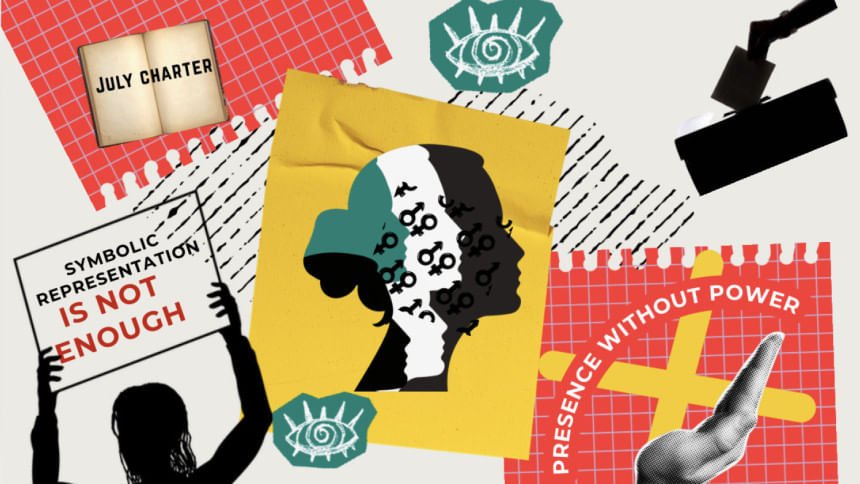A recent national conference organized by the Forum for Women’s Political Rights (FWPR) on October 9 had a significant impact as a political initiative rather than just a routine event. The gathering brought together various stakeholders including activists, scholars, labor organizers, civil society representatives, and political leaders who have been actively challenging the gender biases within Bangladesh’s democratic landscape. The discussions at the conference were framed within a feminist perspective that views women’s political representation not merely as a token gesture of inclusion but as a fundamental battle over defining political agency and influence.
The participation of two women advisers from the interim government, both established advocates for women’s rights, carried symbolic weight and shed light on a critical issue in Bangladesh’s democratic evolution. It highlighted a paradox where women may hold advisory roles and engage in activism, yet their presence in decision-making remains marginalized. This raises the crucial question of how a democracy can claim to progress when a significant portion of its population, women, are systematically excluded from positions of political power.
The ongoing debates surrounding women’s parliamentary representation have been a contentious issue following the recommendations of reform commissions and subsequent deliberations within the National Consensus Commission. The proposal for 100 reserved seats for women through rotation-based direct elections by the Election Reform Commission was a potential avenue to legitimize women’s political participation democratically. However, the consensus commission, largely influenced by political parties, rejected this proposal. Instead, the final July National Charter settled on a compromised solution: maintaining 50 reserved seats with a gradual increase to 100, along with parties being mandated to nominate a minimum of five percent women candidates for general seats, escalating to 33 percent by 2043.
This compromise reflects what scholar Nira Yuval-Davis terms as the “gendered logic of citizenship,” a system that symbolically acknowledges women’s presence but restricts their substantive engagement in power dynamics. The FWPR’s demands for direct election of 100 women’s seats in the upcoming parliamentary cycle underscore a principled stance, asserting that once women establish voter-backed credibility, the necessity for reserved quotas will naturally diminish. Additionally, the FWPR advocates for a legal requirement for all political parties to nominate at least 33 percent female candidates, increasing to 50 percent through amendments to the Representation of the People Order (RPO). The proposed measures, such as state funding for women candidates, protection against political and online harassment, and decentralization of power structures, aim to rectify the entrenched patriarchal norms within party politics.
At the core of these proposals lies a fundamental feminist insight that women’s exclusion from decision-making is not incidental but a result of institutional frameworks. Therefore, representation should not be perceived as a favor extended to women but as a crucial indicator of constitutional equality and democratic legitimacy for all citizens.
The discussions at the FWPR conference highlighted the importance of intersectionality in driving democratic reform forward. Women from marginalized backgrounds such as working-class, informal-sector workers, those with disabilities, and Dalit or Indigenous women face intersecting obstacles in political participation. The conference featured a participant from the Dalit community sharing experiences of repeated denial of electoral nominations by political parties, exposing the systemic exclusion prevalent. To address these challenges, electoral mechanisms must transcend the traditional elite networks and ensure accessibility to political engagement for all women.
The conference’s two advisors, Farida Akhter and Sharmeen Murshid, expressed strong support for the FWPR’s proposals. However, their ability to influence the July Charter or ensure the implementation of reforms remained uncertain. This underscores the prevalent gendered dynamics within Bangladesh’s political landscape where women are visible in peripheral roles but lack substantial influence in decision-making arenas. The existing patriarchal structures within the July Charter hinder women’s political empowerment by perpetuating undemocratic practices of nomination and selection, reinforcing patronage politics and gatekeeping by male party elites.
In conclusion, the FWPR’s call for direct elections and broader reforms aims to dismantle the entrenched patriarchal norms and redefine women’s political representation as a cornerstone of democratic health. The current trajectory, as reflected in the July Charter, perpetuates the status quo, leaving women’s representation confined within limiting frameworks. Revising the charter and reinvigorating citizenship with a renewed focus on women’s representation are essential steps for Bangladesh’s democratic evolution to truly reflect the principles of equality and inclusivity.

